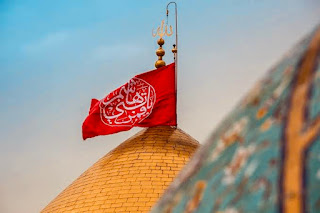Hazrat Abbas Alamdar A.S
Hazrat Abbas ibn Ali, commonly known as Abbas, holds a special place in Islamic history, particularly in the context of the Battle of Karbala. He was the son of Imam Ali ibn Abi Talib and Ummul Banin, and he was the half-brother of Imam Husayn ibn Ali. Hazrat Abbas is highly revered in Shia Islam for his unwavering loyalty, courage, and sacrifice during the tragic events of Karbala in 680 CE.
Born in 647 CE in Medina, Hazrat Abbas grew up in the household of Imam Ali, surrounded by an atmosphere of piety and devotion to Islam. His mother, Ummul Banin, was known for her noble character and dedication to the Ahl al-Bayt (the family of the Prophet Muhammad). Hazrat Abbas was given the kunya "Abu al-Fadl," which means "the father of virtue," highlighting his noble qualities.
Hazrat Abbas played a pivotal role in the Battle of Karbala, a watershed moment in Islamic history that unfolded due to the Umayyad caliph Yazid's tyranny and oppression. Imam Husayn, the grandson of Prophet Muhammad, stood against Yazid's illegitimate rule, and Hazrat Abbas, as a key member of the family, was a beacon of loyalty and bravery.
One of the most poignant aspects of Hazrat Abbas's story is his selflessness and devotion to Imam Husayn and the cause of justice. On the day of Ashura, when the forces of Yazid besieged Imam Husayn's camp and cut off access to the Euphrates River, Hazrat Abbas's loyalty and commitment shone brightly.
Despite the intense thirst prevailing among Imam Husayn's camp, Hazrat Abbas, along with a few companions, ventured into the battlefield to bring water for the thirsty children and women. His mission was not only to quench the thirst of the family but also to provide a lifeline of hope amid the overwhelming odds.
As Hazrat Abbas reached the banks of the Euphrates, he filled his water carrier. However, his unwavering commitment to the mission and his loyalty to Imam Husayn became evident when he refrained from drinking water himself. His thoughts were solely on fulfilling the needs of the family, emphasizing his self-sacrifice and dedication.
Hazrat Abbas's journey back to the camp was fraught with challenges. The enemy forces, aware of his determination, launched a brutal attack. Despite being outnumbered, Hazrat Abbas valiantly defended himself and the water carrier. His actions displayed not only physical prowess but, more importantly, an unyielding spirit of sacrifice.
Tragically, as Hazrat Abbas approached the camp, he faced a momentous test of his resolve. Overwhelmed by the intense thirst and exhaustion, some of Imam Husayn's family members, particularly the children, extended their hands, yearning for the life-giving water. Hazrat Abbas, however, prioritized his loyalty to Imam Husayn's mission.
In a heart-wrenching scene, Hazrat Abbas, with the water carrier still intact, turned away from the pleas of the children. His dedication to Imam Husayn's cause and his commitment to justice took precedence over his own physical needs. This act of supreme sacrifice has become emblematic of Hazrat Abbas's unwavering loyalty and selflessness.
The tragedy of Hazrat Abbas reaches its climax on the battlefield. Despite facing overwhelming odds and being severely fatigued, he continued to fight valiantly. Eventually, an enemy contingent attacked him from both sides, and in the chaos that ensued, Hazrat Abbas's right arm was severed. Undeterred, he continued to fight with his left arm.
The culmination of the tragedy occurred when an enemy soldier struck Hazrat Abbas on the head with a pole fitted with an iron crescent. This fatal blow caused Hazrat Abbas to fall from his horse, calling out to Imam Husayn for help. Imam Husayn, rushing to his brother's side, witnessed the final moments of Hazrat Abbas's life.
Imam Husayn cradled Hazrat Abbas's head in his lap as Abbas uttered his last words, expressing his regret for being unable to fulfill his mission of bringing water to the family. Imam Husayn, grief-stricken, comforted his dying brother, emphasizing his gratitude for Hazrat Abbas's sacrifice and loyalty.
The martyrdom of Hazrat Abbas is a profoundly poignant episode in Islamic history, symbolizing loyalty, sacrifice, and unwavering commitment to justice. His story transcends religious boundaries, resonating with those who appreciate selflessness and bravery in the face of adversity.
Hazrat Abbas is venerated by millions of Shia Muslims worldwide, and his legacy is commemorated annually during the mourning rituals of Muharram, particularly on the day of Ashura. The tragedy of Karbala, with Hazrat Abbas as a central figure, serves as a timeless reminder of the ongoing struggle against oppression and the enduring quest for justice and righteousn




Comments
Post a Comment